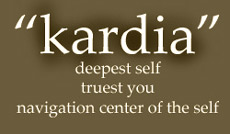As the heart goes, so goes a life
 Tuesday, June 17, 2008 at 3:08PM
Tuesday, June 17, 2008 at 3:08PM 
What is meant by the “heart?” We often think that we only perceive with our minds, yet we can “see” with our hearts. In fact, the heart is the hub that governs all other parts of the self—including the mind, thoughts, feelings, the body and the soul. The function of the heart is “to organize our life as a whole…” says Willard. This description of the self is very much a “systems” way of thinking about life, much like the multiple systems of the human body that cannot function without a healthy heart that effectively pumps blood throughout. An airplane cannot fly in a storm without a properly-functioning navigational system, or it will crash. The heart or human spirit is the navigational system for the rest of the human personality: If it goes wrong, then everything else does as well. Willard goes on to say that the redeemed heart organizes our life around God himself. The unredeemed heart would organize a person’s energies around any number of things: fear, control, shame, mistrust. The unredeemed heart is on a desperate search for life, but continues to drive the person to places that cannot give life. We are thirsty by nature, yet apart from receiving a new heart, we will go to wells that cannot satisfy our thirst. It is also true that our real and settled convictions are formed in our hearts. Our deepest convictions—what we really believe about God—are formed in the heart: “For it is with your heart that you believe and are justified…” (Romans 10:10) For example, the unredeemed heart believes that God cannot be trusted and that a person must strive, grasp and control in order to secure an illusion of life. By contrast, the new and redeemed heart sees the world as saturated through with God’s good kingdom, believes that our Father’s heart towards us is actually good, and that we ourselves can live good, whole, and holy lives in his care. This is why even the doubting and feeble Christian can say with relief, “My heart does trust God’s care! I can now trust and enjoy my Father’s good heart the way Jesus trusted him and enjoyed him.” If the heart (spirit) is not right, all the other parts of the self are not right. As goes the heart, so goes our bodies, our minds and our souls. Each part of the human personality is contingent upon the health of our heart. There is no healthy mind without a healthy heart; no healthy soul without a healthy heart; and no healthy body without a healthy heart. It’s obvious now why Jesus’ saving work has to deal with the heart above all else: the health, wholeness and holiness of our lives depends upon the health, wholeness and holiness of our hearts!
Contrary to popular culture’s view, the heart is not the emotional or feeling side of us. Popular culture tends to think of the heart as the sentimental part of us. (Think of Hallmark cards.) Biblically speaking, our feelings can express what is going on in our hearts, but the heart is much more than feelings. According to the Scriptures, the heart or human spirit is the core of our personality—the true and deepest self. It is the also where reason, understanding, and conscience are located
.
[i] John Ortberg, God Is Closer Than You Think, (Grand Rapids: Zondervan, 2005).
















Reader Comments